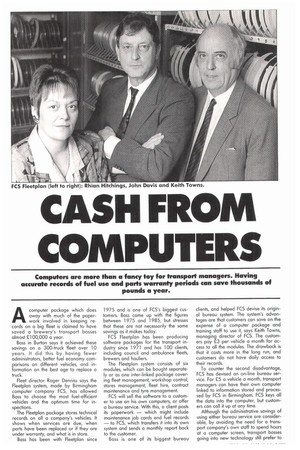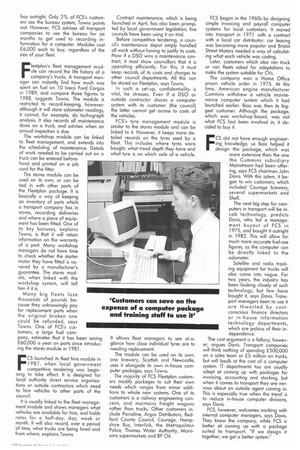CASH FROM COMPUTERS
Page 54

Page 55

If you've noticed an error in this article please click here to report it so we can fix it.
Computers are more than a fancy toy for transport managers. Having accurate records of fuel use and parts warranty periods can save thousands of pounds a year.
Acomputer package which does away with much of the paperwork involved in keeping records on a big fleet is claimed to have saved a brewery's transport bosses almost £100,000 a year.
Bass in Burton says it achieved these savings on a 300-truck fleet over 10 years. It did this by having fewer administrators, better fuel economy comparisons on different vehicles, and information on the best age to replace a truck.
Fleet director Roger Denniss says the Fleetplan system, made by Birmingham computer company FCS, has allowed Bass to choose the most fuel-efficient vehicles and the optimum time for inspections.
The Fleetplan package stores technical records on all a company's vehicles. It shows when services are due, when parts have been replaced or if they are under warranty, and what is in store.
Bass has been with Fleetplan since 1 975 and is one of FCS's biggest customers. Bass came up with the figures between 1975 and 1985, but stresses that these are not necessarily the same savings as it makes today.
FCS Fleetplan has been producing software packages for the transport industry since 1971 and has 100 clients, including council and ambulance fleets, brewers and hauliers.
The Fleetplan system consists of six modules, which can be bought separately or as one inter-linked package covering fleet management, workshop control, stores management, fleet hire, contract maintenance and tyre management.
FCS will sell the software to a customer to use on his own computers, or offer a bureau service. With this, a client posts its paperwork — which might include maintenance job cards and fuel records — to FCS, which transfers it into its own system and sends a monthly report back to the customer.
Bass is one of its biggest bureau clients, and helped FCS devise its original bureau system. The system's advantages are that customers can save on the expense of a computer package and training staff to use it, says Keith Towns, managing director of FCS. The customers pay £3 per vehicle a month for access to all the modules. The drawback is that it costs more in the long run, and customers do not have daily access to their records.
To counter the second disadvantage, FCS has devised an on-line bureau service. For £5 a vehicle a month, transport managers can have their own computer linked to information stored and processed by FCS in Birmingham. FCS keys all the data into the computer, but customers can call it up at any time.
Although the administrative savings of using either bureau service are considerable, by avoiding the need for a transport company's own staff to spend hours at a computer screen, transport bosses going into new technology still prefer to buy outright. Only 2% of FCS's customers use the bureau system, Towns points out. However, FCS advises all transport companies to use the bureau for six months to get used to recording information for a computer. Modules cost £6,000 each to buy, regardless of the size of your fleet.
Fleetplan's fleet management module can record the life history of a company's trucks. A transport manager can instantly find how much was spent on fuel on 10 lveco Ford Cargos in 1989, and compare those figures to 1988, suggests Towns. The module is restricted to record-keeping, however: although it will store odometer readings, it cannot, for example, do tachograph analysis. It also records all maintenance done on a truck, and advises when an annual inspection is due.
The workshop module can be linked to fleet management, and extends into the scheduling of maintenance. Details of work needed to be carried out on a truck can be entered beforehand and printed on a job card for the fitter.
The stores module can be used on its own, or can be tied in with other parts of the Fleetplan package. It is basically a way of keeping an inventory of parts which a transport company has in stores, recording deliveries and where a piece of equipment has been fitted. One of its key bonuses, explains Towns, is that it will retain information on the warranty of a part. Many workshop managers do not have time to check whether the starter motor they have fitted is covered by a manufacturer's guarantee. The stores module, when linked with the workshop system, will tell him if it is.
Many big fleets lose thousands of pounds because they unknowingly pay for replacement parts when the original broken one could be refunded, says Towns. One of FCS's customers, a large fuel company, estimates that it has been saving £60,000 a year on parts since introducing the stores module in 1981.
FCS launched its fleet hire module in 1987, when local government competitive tendering was beginning to take effect. It is designed for local authority direct service organisations or outside contractors which need to hire vehicles to other parts of the council.
It is usually linked to the fleet management module and shows managers what vehicles are available for hire, and holds rates for a half-day, day, week or month. It will also record, over a period of time, what trucks are being hired and from where, explains Towns. Contract maintenance, which is being launched in April, has also been prompted by local government legislation; five councils have been using it on trial.
Before competitive tendering, a council's maintenance depot simply handled all work without having to justify its costs. Now if a DSO wins a maintenance contract, it must show councillors that it is operating efficiently. For this, it must keep records of its costs and charges to other council departments. All this can be stored on Fleetplan, says Towns.
In such a set-up, confidentiality is vital, he stresses. Even if a DSO or outside contractor shares a computer system with its customer (the council) the latter cannot get access to costs of the vehicles.
FCS's tyre management module is similar to the stores module and can be linked to it. However, it keeps more detailed records on the tyres used by a fleet. This includes where tyres were bought, what tread depth they have and what tyre is on which axle of a vehicle.
It allows fleet managers to see at-aglance how close individual tyres are to needing replacement.
The module can be used on its own: one brewery, Scottish and Newcastle, uses it alongside its own in-house computer packages, says Towns.
The majority of FCS Fleetplan customers modify packages to suit their own needs which ranges from minor additions to whole new systems. One of its customers is a railway engineering concern, and maintains freight wagons rather than trucks. Other customers include Parceline, Argos Distributors, Bedford County Council, Courage, Hampshire Bus, Interlink, the Metropolitan Police, Thames Water Authority, MornSons supermarkets and BP Oil. FCS began in the 1960s by designing simple invoicing and payroll computer systems for local customers. It moved into transport in 1 971 with a contract with a local car distributor: car leasing was becoming more popular and Bristol Street Motors needed a way of calculating what each vehicle was costing.
Later, customers which also ran truck or van fleets asked for adaptations to make the system suitable for CVs.
The company won a Home Office prison vehicle order in 1975. At this time, American engine manufacturer Cummins withdrew a vehicle maintenance computer system which it had launched earlier. Bass was then its biggest customer. Although the package, which was workshop-based, was not what FCS had been involved in, it decided to buy it.
FCS did not have enough engineering knowledge, so Bass helped it design the package, which was more extensive than the one the Cummins subsidiary Mainstream had been offering, says FCS chairman John Davis. With this sytem, it began to win customers, which included Courage brewery, several supermarkets and Shell.
The next big step for computers in transport will be incab technology, predicts Davis, who led a management buyout of FCS in 1975, and bought it outright in 1982. This will allow for much more accurate fuel-use figures, as the computer can be directly linked to the odometer.
Satellite and radio tracking equipment for trucks will also come into vogue. For two years, the industry has been looking closely at such technology, but few have bought it, says Davis. Transport managers keen to use it are thwarted by costconscious finance directors or in-house information technology departments, which are jealous of their independence.
The cost argument is a fallacy, however, argues Davis. Transport companies will think nothing of spending £500,000 on a sales team or £5 million on trucks, but will baulk at the cost of a computer system. IT departments too are usually adept at coming up with packages for invoicing, accounting and stocking, but when it comes to transport they are nervous about an outside agent coming in. This is especially true when the trend is to reduce in-house computer divisions, says Davis.
FCS, however, welcomes working with internal computer managers, says Davis. They know the company, while FCS is better at coming up with a package suited to transport. If we design it together, we get a better system."




































































































































































